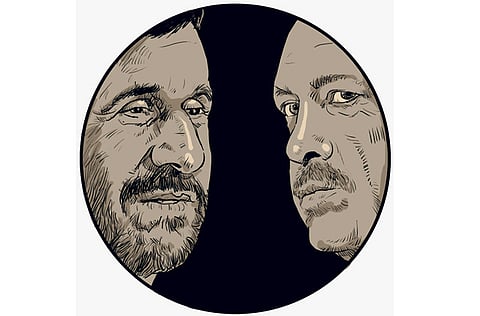Lebanon's behind-the-scenes players
As the world focuses on the Syrian-Saudi dialogue, Turkey and Iran hold the key to making any political deal work

There has been much talk about Syrian-Saudi dialogue over Lebanon, but very little focus on Turkish-Iranian understanding over the tiny Mediterranean country. Last week, however, Turkish Prime Minister Recep Tayyip Erdogan made a groundbreaking visit to Beirut, followed this week by his Lebanese counterpart Sa'ad Hariri's equally historic visit to Tehran.
At first glance, the common drive behind this shuttle diplomacy is fairly clear: the Special Tribunal for Lebanon (STL) which many fear will name senior Hezbollah figures in the 2005 murder of Lebanon's former prime minister Rafik Hariri. Both Turkey and Iran are trying to use their heavyweight influence in the international community to postpone indictments in the Hariri Affair, expected anytime between now and next March.
Both of them, however, are handling Lebanon at a macro-level, preferring to leave details of any broad deal between Hariri and Hezbollah to the Syrians and Saudis. A closer look, however, tells another side of the story, complementing what is being engineered by Damascus and Riyadh.
When the Justice and Development Party (AKP) came to power, many coined its new foreign policy, via the neighbourhood, as neo-Ottomanism, suggesting the revival of Turkish cultural, political and economic influence over former territories of the Ottoman Empire. Many wrongly interpreted Erdogan's policy towards the Arab world as purely a Syrian-Turkish alliance. By nature of his new orientation, Erdogan was striving to restore Turkey to its rightful place amongst Arab and Muslim nations, and that by no means stops at the gates of Damascus. It is a policy that embraces Egypt, Jordan, Palestine, Syria, Iraq and, of course, Lebanon.
Almost a year ago, Erdogan received Hariri in Turkey, where the two leaders agreed to boost technical and scientific cooperation in military affairs and lift visa requirements between Lebanon and Turkey. Bilateral trade, which stood at $225 million (Dh825.75 million) in 2002, now stands at $900 million.
It also means that Turkey has now lifted visa requirements with six Arab countries, the others being Libya, Morocco, Tunisia, Jordan and Syria. Erdogan best explained it by saying that a "regional Schengen" system, similar to the agreement signed between European countries in Luxembourg in 1985, has now gone into effect in the region, removing border controls between these countries — making them closer to how they had been under the Ottoman Empire.
Erdogan's latest visit to Beirut follows similar visits in 2007 and 2008. During the war of 2006 and its aftermath, he sent 600 Turkish troops to take part in peacekeeping on the Lebanese-Israeli border by Unifil. Erdogan saw to it that $50 million worth of aid was given to reconstruct southern Lebanon, along with building 41 schools, five parks and a rehabilitation centre worth $20 million.
On the Iranian side, Tehran has also made it clear that it wants to maintain a strong influence: economic, political, and social and has the advantage of a 20-year precedence over Turkey in Lebanese affairs. It achieved that with thundering success through non-state players like Hezbollah since the end of the Civil War and is now seeking to establish sound institutional ties through Lebanese officialdom.
According to Iranian sources in Beirut, the trade volume between the two countries has the potential to reach $10 billion annually. Iran is already heavily involved in academic, cultural and religious exchanges with entire districts in South Lebanon.
Some might wrongly say that "competition" for Lebanon is under way between Turkey and Iran, but the term is grossly exaggerated given that it is not in Turkey's interest. Besides, Ankara doesn't have the ability to venture so strongly into territories regarded for years as spheres of influence for Tehran in the Arab world.
Both countries, however, clearly have a well-planned agenda for the Arab world. Both are regional superpowers with the ability to deliver, and both happen to share similar political views — if not approaches — on several issues related to the Palestinian cause, Hamas, and Hezbollah. Today the two countries find yet another commonality in wanting to shelter Lebanon from the STL, seeing that indictments against Hezbollah members could spell disaster for the entire neighbourhood. Erdogan has the ear of Hariri while Hassan Nasrallah always listens to Mahmoud Ahmadinejad.
Deal in the making
Syria and Saudi Arabia are trying to hammer out a deal that focuses on postponing the STL indictments and getting Hariri to relinquish his country's political, financial and legal commitments to the STL. This has to be done, all parties are told, before the STL issues its indictments. Hariri would also be asked to reaffirm his commitment to "protecting and embracing the arms" of Hezbollah, and to take serious action against false witnesses in the Hariri Affair. When he does that, Hezbollah will see to it that he is empowered as a national leader in Lebanon, that his cabinet is preserved through a truce between all parties that will last until the upcoming parliamentary and presidential elections.
Turkey can provide the Lebanese with plenty of business opportunities to distract them from bickering among themselves, while Iran can make sure that any deal signed off by Saudi Arabia and Syria, is upheld and respected by Hezbollah. Syria and Saudi Arabia will do the rest.
- Sami Moubayed is editor-in-chief of Forward Magazine.



